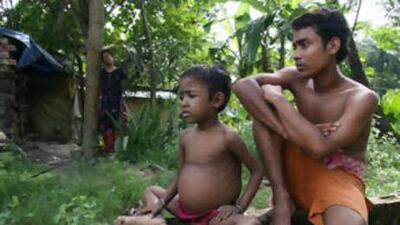Raju Sardar, 16, holds on tight to his five-year-old sister, Rimi, as he jumps aboard a packed train heading to India's eastern city of Kolkata. It is a journey the pair make four times a month from their small village, 70km south of Kolkata, a five-hour trip each way. Rimi was born with thalassaemia, a permanent blood disorder that means she needs regular blood transfusions. Two years ago, she contracted HIV and hepatitis B after receiving a transfusion with contaminated blood from Kolkata's largest government blood bank. Their mother died this year in a political protest. Their father was jailed for political violence last week. "I could have managed everything on my own had she not been infected with the killer diseases ? I cannot see light at the end of the tunnel," Raju said. Rimi's story is not unique. Ashok Ghosh, a Kolkata-based Aids activist, estimates that 10,000 children with thalassaemia have been infected with HIV over the past five years after using tainted blood from the country's blood banks. Mr Ghosh works for a non-governmental organisation that helps thalassaemic children with free medicine and free transfusions. Kolkata's Thalassaemia and Aids Prevention Society (TAPS) estimates there are 400 such cases in West Bengal state. The society, following a yearlong survey, found that most families with HIV-infected children did not want to go public with the information because they feared not being able to get blood for their children. "Although they all know that the children got the infection through tainted blood, the families of the victims in almost all cases do not want to put any blame on the government blood bank for the infection because they need their [blood-bank officials'] co-operation for future supply of blood for their children," said Shailen Ghosh, the TAPS secretary. Because there has been no official complaint from families about West Bengal's largest blood bank, the government has not launched any investigation and the blood bank has been allowed to continue to offer tainted blood, and infect more children, he said. The stigma and ignorance surrounding HIV/Aids in India was also causing some difficulties, and many parents refused to divulge their children's status for fear of discrimination, he said. Last year, doctors and paramedics at a government hospital in Kolkata refused to conduct a vital abdominal surgery on Maniur Rahaman, a thalassaemic child, who had been infected with HIV via a transfusion. The surgery was carried out after human rights activists protested outside the hospital. Before his imprisonment, Rimi's father took her case to West Bengal state's Human Rights Commission, demanding that officials investigate how his daughter was infected with HIV and urging authorities to minimise health risks for others. Akhil Mandal, the director of the Kolkata blood bank, has refused to comment on the case, citing the ongoing investigation. However, Rimi's father told investigators that a senior administrative officer of the blood bank visited his family last year to urge them not to take legal action. "Prasun Bhattacharya [the officer] begged forgiveness on behalf of the blood bank for having infected my daughter with fatal diseases," Shankha Sardar said in his affidavit before the state's human rights commission. An investigator with the commission, who reviewed Rimi's case history, said it was easy to prove that Kolkata's Central Blood Bank was at fault and recommended tough action against the blood bank. "[In the blood bank] unlike existing tests for HIV, available tests for hepatitis B were foolproof. "The infections of Rimi and other children with hepatitis B prove that the screening cell of the blood bank did not do their job properly in multiple cases and endangered children's lives," said the investigator, who is also a senior police officer and did not want to be identified. Mr Ghosh, the Aids activist, said government banks were worse than the private-run ones. "Poorer families come to government banks, where blood is cheaper or free. So, most of the children who get the fatal infections are from poorer families, and like Rimi they all are suffering miserably," he said. Activists are trying to persuade the families to launch a nationwide campaign to force the government to revamp the monitoring system in blood banks. The current screening method for HIV in donated blood, the so-called Elisa test, can fail to detect the virus in just-infected donors or those in the "window period", the time between first or actual infection and when the test can reliably detect that infection. They are demanding the screening be replaced with the more comprehensive DNA PCR (polymerase chain reaction) method. This year, People for Better Treatment [PBT], an Indian patients' rights body, appealed to the country's National Human Rights Commission for justice for countless people who contracted HIV through contaminated blood transfusions. Kunal Saha, the Indian-American Aids researcher who founded PBT, was part of a World Bank team investigating fraud and corruption related to the mass circulation of substandard HIV testing kits to hospitals and blood banks across India. "A comprehensive report published by the World Bank in January 2008 has made scathing observation of rampant fraud and corruption in India's 'National Aids Control Programme - 2' including the use of defective HIV testing kits at hospitals and blood banks across India. "All individuals involved in supply of the contaminated blood should be punished and all victims who contracted HIV through transfusion of tainted blood should be given adequate financial compensation." Activists from groups including TAPS also want the government to pay compensation to the children and their families. But for Rimi's father, financial compensation will never be enough to compensate for their pain. Yesterday, Rimi was admitted to hospital where doctors diagnosed her with kidney and liver infections. * The National

Blood disorder sufferers given HIV
Rimi, born with thalassaemia, contracted HIV after a blood transfusion from a Kolkata government blood bank.
Most popular today
